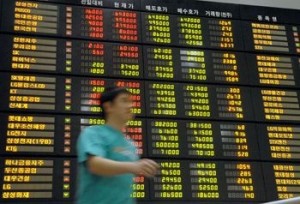In an interesting move to encourage economic development, Cambodia recently opened its first stock exchange, the Cambodia Securities Exchange (CSX). What part of that is interesting, you may be wondering? Well, currently there are no stocks to trade, no companies listed, which makes this the smallest stock exchange in the world. It’s sort of like opening a car dealership with no cars, or a casino with no cards or dice.
companies listed, which makes this the smallest stock exchange in the world. It’s sort of like opening a car dealership with no cars, or a casino with no cards or dice.
The exchange was set up through a partnership with South Korea’s stock exchange (KRX), which also helped set up a similar exchange in Laos 6 months ago. Laos currently has two stocks, a benchmark Cambodians hope to pass by the end of the year. 3 state-owned companies are currently preparing listings, and rumor is several private companies are also working on getting listed. Listing is a difficult process, as companies must meet specific requirements set by the stock exchange, and it can take up to 2 years for businesses to get things up to standard. As of now, no one is certain that any companies will be able to list in the CSX anytime soon.
So why bother to create a stock exchange with no stocks to trade and no certainty that any company will ever be able to meet the minimum requirements to list? What does the Cambodian government hope to achieve? Well, creating a stock exchange has several benefits, even for a country that currently does not have any stocks to exchange. A stock market is a valuable tool for economic development, as it opens a new avenue for saving and investment. Currently, Cambodia is a largely cash-only economy, with many people keeping their money at home instead of depositing it in the bank. Once companies begin to go public people can invest their money in the market, which will help improve the economy. Ideally the market will attract international investors as well, as having a stock exchange marks a transition to a new stage of financial development. Before the market Cambodia could only get international funds through aid and bank loans, so the exchange could be a great benefit to the economic development of the country if foreign investment flows in through the exchange. Also, the stock exchange will hopefully help reduce dependence on the dollar, which accounts for about 90% of the currency in circulation. Trades in the exchange can be completed with dollars for the first 3 years of operation, but then will be transitioned to the local currency, the riel. This will give the central bank, which issues the riel, more control over the economy, since the amount of dollars in the banking system has always made it difficult to slow or stimulate the economy and inflation.
Also, Cambodia is hardly the first country to open a stock exchange with no stocks. It was 3 years before any company listed in Cameroon’s Douala Stock Exchange, and Bulgaria was in a similar situation when their market opened. The KRX, which is now strong enough to encourage emerging markets to create their own exchanges, was opened just 3 years after the Korean War and took 10 years to contribute to economic development. So, a slow start is not necessarily a death sentence for a new exchange. In a decade or two, the CSX could be bringing in revenue and contributing to the Cambodian economy.
There are more problems with the CSX than just the lack of listings, however. Cambodia ranks very low on the Transparency International Corruption Perceptions index (hint: Cambodia is located between Thailand and Vietnam, below Laos and China), and so it is possible that the exchange will become just another tool to benefit the elite at the expense of the rest of the country. There is no guarantee that the regulations set up to fight crime and ensure open, law-abiding exchange will be followed, which could discourage both foreign and domestic investment. As I mentioned earlier, the Cambodian economy is mostly cash-based, and so it will take a lot to encourage Cambodians to invest their money in the exchange when they currently do not trust banks enough to deposit their money. Further, family-owned businesses are a part of the Cambodian culture, and so they will be understandably hesitant to sell part of their stock to others. Convincing companies to list and convincing people to invest their money in the CSX is going to require changing traditions and culture, a very difficult thing to do.
I will leave you with a question. Do you think the economic benefits of a stock exchange (economic development, foreign investment, more central control over the economy) will be worth it—or even come to be—or do you think the Cambodian government should have committed to a different development project? And if you’re wondering why you should bother thinking about this at all given the current economic situation in the United States, remember that America is not immune to shifts in the global economy. If Cambodia’s securities exchange succeeds it will have an impact on the global economy, which in turn will affect America.
Michelle Bovée is a SISGI Group Program and Research Intern focused on international affairs, economic development, and responsible tourism. To learn more about the SISGI Group visit www.sisgigroup.org



1 pings
[…] fjs); }(document, "script", "facebook-jssdk")); Over the summer I wrote a blog post about the Cambodian Securities Exchange (CSX), which is the world’s smallest stock market—a stock market without stocks. I explained that […]